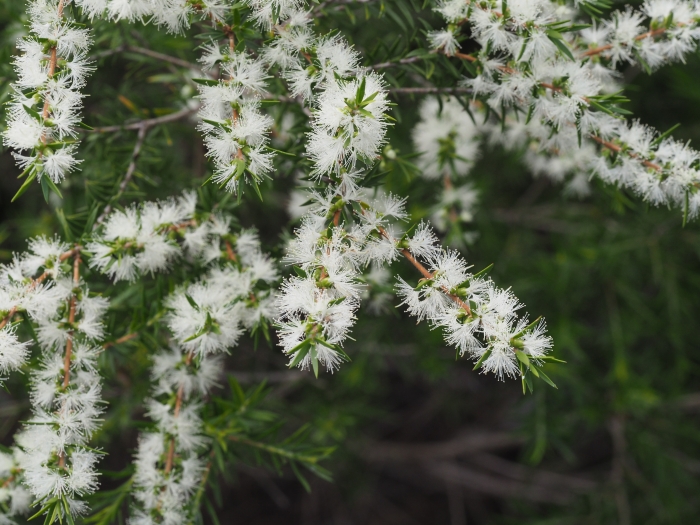River Tea-Tree
(Melaleuca bracteata)
River Tea-Tree (Melaleuca bracteata)
/
/

Geoff Derrin
CC BY-SA 4.0
Image By:
Geoff Derrin
Recorded By:
Copyright:
CC BY-SA 4.0
Copyright Notice:
Photo by: Geoff Derrin | License Type: CC BY-SA 4.0 | License URL: https://creativecommons.org/licenses/by-sa/4.0 | Uploader: Gderrin | Publisher: Wikimedia Commons | Title: Melaleuca_bracteata_leaves_and_flowers.jpg | Notes: User created page with UploadWizard |


























Estimated Native Range
Summary
Melaleuca bracteata, commonly known as River Tea-Tree, is an evergreen shrub or small to medium-sized tree native to open woodlands, floodplains, and along watercourses in Australia. It typically grows to 5–8 m (16–26 ft) tall, though it can occasionally reach greater heights. The River Tea-Tree has a bushy foliage with a dense, rounded crown and a compact shape, making it an attractive ornamental plant. Its flowers, which are cream or white, appear in loose clusters forming cylindrical or ovoid spikes, 30–90 mm (1–4 in) long by about 15 mm (0.6 in) across. Each flower typically has a leaf at its base, and the petals are shed soon after the flower opens. The flowering season extends from spring to early summer, and the flowers are followed by spherical to oval or barrel-shaped fruit, about 3 mm (0.1 in) in diameter, sparsely arranged along the branches.
River Tea-Tree is valued for its adaptability, as it can grow in a variety of conditions, and for its profuse flowering which adds ornamental value. It is used in urban planting, as a windbreak, and for erosion control due to its hardiness and compact growth habit. In cultivation, it prefers full sun to part shade, tolerates a range of soil types, and requires minimal water once established. It is also used for honey production and has medicinal properties. However, it can become invasive outside its native range, so caution is advised.CC BY-SA 4.0
River Tea-Tree is valued for its adaptability, as it can grow in a variety of conditions, and for its profuse flowering which adds ornamental value. It is used in urban planting, as a windbreak, and for erosion control due to its hardiness and compact growth habit. In cultivation, it prefers full sun to part shade, tolerates a range of soil types, and requires minimal water once established. It is also used for honey production and has medicinal properties. However, it can become invasive outside its native range, so caution is advised.CC BY-SA 4.0
Plant Description
- Plant Type: Tree, Shrub
- Height: 3-22 feet
- Width: 3-15 feet
- Growth Rate: Rapid
- Flower Color: White
- Flowering Season: Spring, Summer
- Leaf Retention: Evergreen
Growth Requirements
- Sun: Full Sun
- Water: Medium
- Drainage: Medium, Fast
Common Uses
Bee Garden, Bird Garden, Butterfly Garden, Fragrant, Hedges, Hummingbird Garden, Low Maintenance, Showy Flowers, Street Planting
Natural Habitat
native to open woodlands, floodplains, and along watercourses in Australia
Other Names
Common Names: Black Tea-Tree, River Tea Tree, Black Tea Tree, Mock Olive, Bracteate Honey Myrtle, White Cloudtree, Prickly-Leaf Teatree, Oron-Wood, Ridge Myrtle
Scientific Names: , Melaleuca bracteata, Melaleuca monticola, Melaleuca daleana, Melaleuca genistifolia var. coriacea, Melaleuca glaucocalyx,
GBIF Accepted Name: Melaleuca bracteata F.Muell.